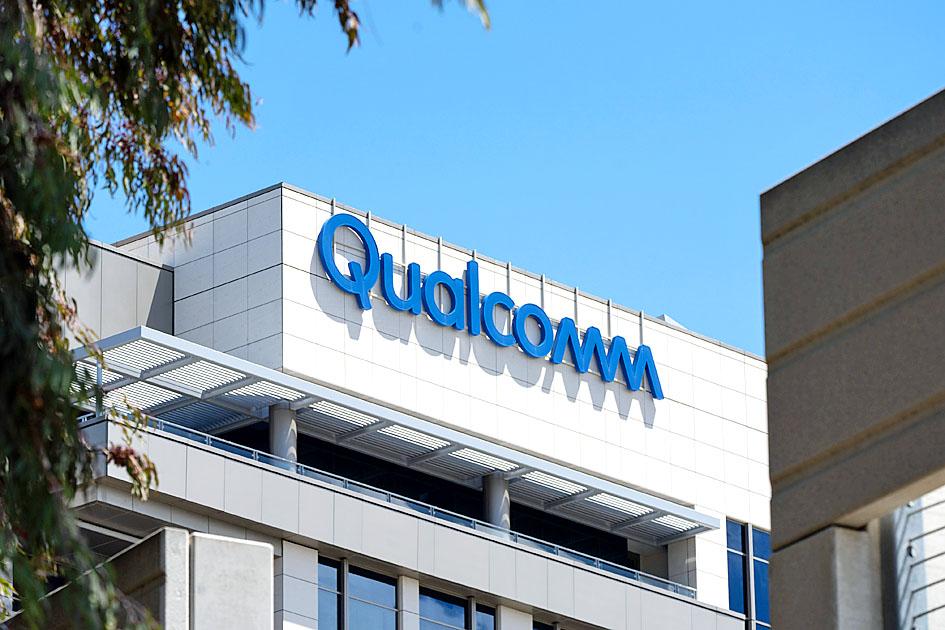Qualcomm Inc yesterday said that it is working with local partners, including Acer Inc (宏碁), to supply new Snapdragon processors for 5G-enabled laptops in its bid to challenge industry leader Intel Corp and expand its presence in the computer market.
The US chipmaker entered the notebook computer market four-and-a-half years ago with Microsoft Corp, but did not achieve as much market uptake as it had hoped.
Together with Microsoft and Google Inc’s Chrome, Qualcomm aims to transfer all top-class and essential applications on mobile phones to laptop computers, said Alex Katouzian, a senior vice president and general manager of Qualcomm Technologies Inc’s mobile business.

Photo: Bing Guan, Bloomberg
The firm said its Snapdragon processors give laptops good artificial intelligence, videoconferencing and audio capabilities, along with a long battery life.
Those were the lessons Qualcomm learned in partnering with Microsoft and Google, Katouzian told a virtual media briefing for the Computex Taipei trade show.
With the new processors, Qualcomm is targeting every tier, from thin and light notebooks to Chromebooks and from entry-level to premium models, except for the gaming segment, he said.
Qualcomm announced its partnership with Acer, which is to use the Snapdragon 8cx Generation 2 5G Compute Platform to enable laptop users to use 5G millimeter wave or sub-6 gigahertz 5G technology to connect to the Internet.
During the virtual briefing, the Hsinchu-based Acer showcased four Windows 10 laptops operating on Snapdragon processors.
Qualcomm said that it would not rule out the possibility of extending its Snapdragon product line to desktops.
“Our roadmap does not currently address desktop PCs, but it is not a closed matter,” Katouzian said.
Qualcomm Technologies has entered into a definitive agreement to acquire semiconductor start-up Nuvia Inc for about US$1.4 billion, he said, adding that desktop computers “could be a category that we apply our technologies to and integrate with our SoC [system on a chip] later, but at this point we don’t have any plan.”
Nuvia has a central processing unit and technology design team, with strong expertise in SoCs, high-performance processors and power management for compute-intensive devices and applications, Qualcomm said.

Taiwan Semiconductor Manufacturing Co (TSMC, 台積電) secured a record 70.2 percent share of the global foundry business in the second quarter, up from 67.6 percent the previous quarter, and continued widening its lead over second-placed Samsung Electronics Co, TrendForce Corp (集邦科技) said on Monday. TSMC posted US$30.24 billion in sales in the April-to-June period, up 18.5 percent from the previous quarter, driven by major smartphone customers entering their ramp-up cycle and robust demand for artificial intelligence chips, laptops and PCs, which boosted wafer shipments and average selling prices, TrendForce said in a report. Samsung’s sales also grew in the second quarter, up

On Tuesday, US President Donald Trump weighed in on a pressing national issue: The rebranding of a restaurant chain. Last week, Cracker Barrel, a Tennessee company whose nationwide locations lean heavily on a cozy, old-timey aesthetic — “rocking chairs on the porch, a warm fire in the hearth, peg games on the table” — announced it was updating its logo. Uncle Herschel, the man who once appeared next to the letters with a barrel, was gone. It sparked ire on the right, with Donald Trump Jr leading a charge against the rebranding: “WTF is wrong with Cracker Barrel?!” Later, Trump Sr weighed

LIMITED IMPACT: Investor confidence was likely sustained by its relatively small exposure to the Chinese market, as only less advanced chips are made in Nanjing Taiwan Semiconductor Manufacturing Co (TSMC, 台積電) saw its stock price close steady yesterday in a sign that the loss of the validated end user (VEU) status for its Nanjing, China, fab should have a mild impact on the world’s biggest contract chipmaker financially and technologically. Media reports about the waiver loss sent TSMC down 1.29 percent during the early trading session yesterday, but the stock soon regained strength and ended at NT$1,160, unchanged from Tuesday. Investors’ confidence in TSMC was likely built on its relatively small exposure to the Chinese market, as Chinese customers contributed about 9 percent to TSMC’s revenue last

LOOPHOLES: The move is to end a break that was aiding foreign producers without any similar benefit for US manufacturers, the US Department of Commerce said US President Donald Trump’s administration would make it harder for Samsung Electronics Co and SK Hynix Inc to ship critical equipment to their chipmaking operations in China, dealing a potential blow to the companies’ production in the world’s largest semiconductor market. The US Department of Commerce in a notice published on Friday said that it was revoking waivers for Samsung and SK Hynix to use US technologies in their Chinese operations. The companies had been operating in China under regulations that allow them to import chipmaking equipment without applying for a new license each time. The move would revise what is known